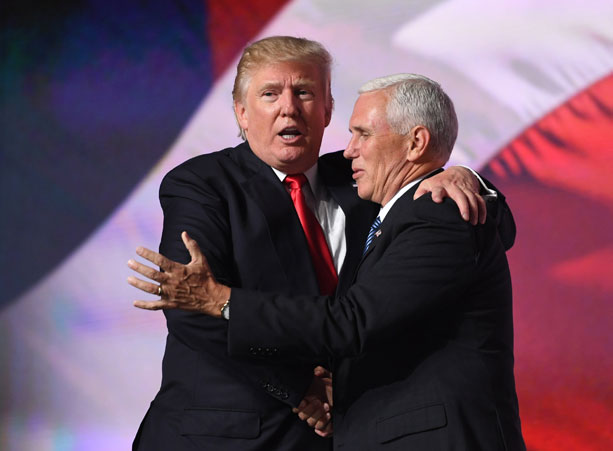 Photo by Jabin Botsford, The Washington Post
Photo by Jabin Botsford, The Washington Post
Mike Pence's debate victory was a striking blow for normality.
In fact, beneath the sound and the fury of the Trump campaign, normal Republicans are having a pretty good year. Pence had an exemplary introduction on the national stage. GOP Senate candidates are holding their own.
House Speaker Paul Ryan, flying the banner of a traditional Republican agenda of uplift, could well minimize GOP losses in the House.
Of course, normal Republicans lost in a rout to Donald Trump in the presidential primary, and their fate is intertwined with his. If the bottom falls out for him, it'll inevitably sink other Republicans, too.
But Trump's incendiary populism is represented only at the top of the ticket, where it's losing a winnable race, while more conventional down-ballot Republicans are so far hanging in there.
Republican Senate candidates consistently outperform Trump. According to the latest batch of polls from Quinnipiac over the past couple of days, Marco Rubio is at 48 percent in Florida, and Trump is at 44 (all Trump's numbers are from the two-way). Rob Portman is at 55 in Ohio, and Trump is at 46. Pat Toomey is at 50 in Pennsylvania, and Trump at 43. Richard Burr in North Carolina, though, is even with Trump at 46.
New Monmouth polls tell the same story. They have Portman at 54 and Trump at 42 (all Trump's numbers are from the four-way race). Toomey is at 46, and Trump at 40. In Colorado, Trump is outpacing Senate candidate Darryl Glenn (38 for Trump; 35 for Glenn), but Glenn's nomination is considered a mistake that kicked away any chance of beating the incumbent Democrat, Michael Bennet.
According to the RealClearPolitics average, Kelly Ayotte is running 10 points ahead of Trump in New Hampshire. Even an embattled incumbent senator like Wisconsin's Ron Johnson is doing 3.3 points better than Trump in his state.
This isn't typical.
A Republican consultant who looked at data going back to 1996 found that swing-state Senate incumbents tend to run even with the presidential candidate and no more than 2 points ahead, except in a couple of extraordinary cases.
Consider Portman. He's no one's idea of a bomb-thrower. His political hero is George H.W. Bush. But he's doing better than Trump in a Trump-friendly state. Portman has a strong and trusted political brand he has carefully protected this year, endorsing Trump while distancing himself from him at the same time. And the Ohio senator has done the fundamental blocking and tackling of a serious, disciplined candidate determined to win.
In a year when all the rules are supposed to be suspended, the rules are still highly useful. Pence prepared for the debate in boringly conventional ways. He studied up. He held mock debate sessions with Wisconsin Gov. Scott Walker. He had a strategy and executed it, deflecting things he didn't want to talk about (i.e., most of Trump's controversial statements and heterodox positions) and pivoting back to things he did want to discuss. If Trump had done the same in the first presidential debate, the race might look different today.
Trump's highly combative and unorthodox campaign style, coupled with a focus on trade and immigration almost to the exclusion of anything else, is proving to be an obstacle to overcome, rather than a boost for the party and himself. The question is whether Trump can win despite his abnormality rather than because of it.
This isn't to say Trump doesn't have distinctive strengths. He symbolizes change. He knows how to play the media like no one else. He has a deep connection to his base.
Surely, if Mike Pence had run for president this year, Trump would have squashed him like a bug just like he did everyone else - festooning him with an unflattering nickname and belittling and unmanning him at the debates.
Nonetheless, Trump has been at his best this campaign when he has tried hardest to attain a simulacrum of normality. His new discipline after his August swoon was the reason - together with Hillary Clinton's struggles - that he nearly pulled into a tie before the first debate. If he's going to come back again, it won't be with 3 a.m. tweets and attacks on ordinary people who have crossed him.
It still wants to be a change election, which is another way of saying that it wants to be a Republican year - if Trump can manage to act the part.
Comment by clicking here.



 Contact The Editor
Contact The Editor
 Articles By This Author
Articles By This Author